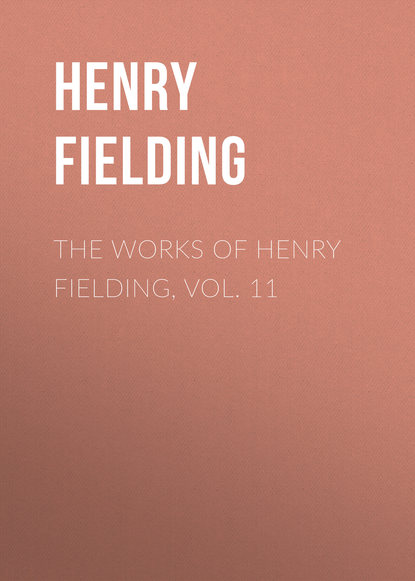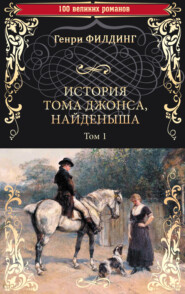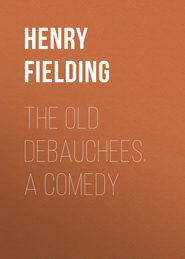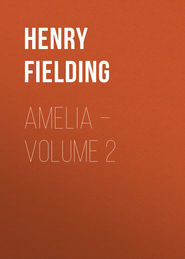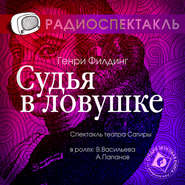По всем вопросам обращайтесь на: info@litportal.ru
(©) 2003-2024.
✖
The Works of Henry Fielding, vol. 11
Настройки чтения
Размер шрифта
Высота строк
Поля
The original poets were not, however, without excuse. They found the limits of nature too strait for the immensity of their genius, which they had not room to exert without extending fact by fiction: and that especially at a time when the manners of men were too simple to afford that variety which they have since offered in vain to the choice of the meanest writers. In doing this they are again excusable for the manner in which they have done it.
Ut speciosa dehinc miracula promant
They are not, indeed, so properly said to turn reality into fiction, as fiction into reality. Their paintings are so bold, their colours so strong, that everything they touch seems to exist in the very manner they represent it; their portraits are so just, and their landscapes so beautiful, that we acknowledge the strokes of nature in both, without enquiring whether Nature herself, or her journeyman the poet, formed the first pattern of the piece.
But other writers (I will put Pliny at their head) have no such pretensions to indulgence; they lye for lying sake, or in order insolently to impose the most monstrous improbabilities and absurdities upon their readers on their own authority; treating them as some fathers treat children, and as other fathers do laymen, exacting their belief of whatever they relate, on no other foundation than their own authority, without ever taking the pains of adapting their lies to human credulity, and of calculating them for the meridian of a common understanding; but, with as much weakness as wickedness, and with more impudence often than either, they assert facts contrary to the honour of God, to the visible order of the creation, to the known laws of nature, to the histories of former ages, and to the experience of our own, and which no man can at once understand and believe.
If it should be objected (and it can nowhere be objected better than where I now write,[12 - At Lisbon.] as there is nowhere more pomp of bigotry) that whole nations have been firm believers in such most absurd suppositions, I reply, the fact is not true. They have known nothing of the matter, and have believed they knew not what. It is, indeed, with me no matter of doubt but that the pope and his clergy might teach any of those Christian heterodoxies, the tenets of which are the most diametrically opposite to their own; nay, all the doctrines of Zoroaster, Confucius, and Mahomet, not only with certain and immediate success, but without one Catholick in a thousand knowing he had changed his religion.
What motive a man can have to sit down, and to draw forth a list of stupid, senseless, incredible lies upon paper, would be difficult to determine, did not Vanity present herself so immediately as the adequate cause. The vanity of knowing more than other men is, perhaps, besides hunger, the only inducement to writing, at least to publishing, at all. Why then should not the voyage-writer be inflamed with the glory of having seen what no man ever did or will see but himself? This is the true source of the wonderful in the discourse and writings, and sometimes, I believe, in the actions of men. There is another fault, of a kind directly opposite to this, to which these writers are sometimes liable, when, instead of filling their pages with monsters which nobody hath ever seen, and with adventures which never have, nor could possibly have, happened to them, waste their time and paper with recording things and facts of so common a kind, that they challenge no other right of being remembered than as they had the honour of having happened to the author, to whom nothing seems trivial that in any manner happens to himself. Of such consequence do his own actions appear to one of this kind, that he would probably think himself guilty of infidelity should he omit the minutest thing in the detail of his journal. That the fact is true is sufficient to give it a place there, without any consideration whether it is capable of pleasing or surprising, of diverting or informing, the reader.
I have seen a play (if I mistake not it is one of Mrs Behn’s or of Mrs Centlivre’s) where this vice in a voyage-writer is finely ridiculed. An ignorant pedant, to whose government, for I know not what reason, the conduct of a young nobleman in his travels is committed, and who is sent abroad to shew my lord the world, of which he knows nothing himself, before his departure from a town, calls for his journal to record the goodness of the wine and tobacco, with other articles of the same importance, which are to furnish the materials of a voyage at his return home. The humour, it is true, is here carried very far; and yet, perhaps, very little beyond what is to be found in writers who profess no intention of dealing in humour at all.
Of one or other, or both of these kinds, are, I conceive, all that vast pile of books which pass under the names of voyages, travels, adventures, lives, memoirs, histories, &c., some of which a single traveller sends into the world in many volumes, and others are, by judicious booksellers, collected into vast bodies in folio, and inscribed with their own names, as if they were indeed their own travels: thus unjustly attributing to themselves the merit of others.
Now, from both these faults we have endeavoured to steer clear in the following narrative; which, however the contrary may be insinuated by ignorant, unlearned, and fresh-water critics, who have never travelled either in books or ships, I do solemnly declare doth, in my own impartial opinion, deviate less from truth than any other voyage extant; my lord Anson’s alone being, perhaps, excepted.
Some few embellishments must be allowed to every historian; for we are not to conceive that the speeches in Livy, Sallust, or Thucydides, were literally spoken in the very words in which we now read them. It is sufficient that every fact hath its foundation in truth, as I do seriously aver is the case in the ensuing pages; and when it is so, a good critic will be so far from denying all kind of ornament of stile or diction, or even of circumstance, to his author, that he would be rather sorry if he omitted it; for he could hence derive no other advantage than the loss of an additional pleasure in the perusal.
Again, if any merely common incident should appear in this journal, which will seldom I apprehend be the case, the candid reader will easily perceive it is not introduced for its own sake, but for some observations and reflexions naturally resulting from it; and which, if but little to his amusement, tend directly to the instruction of the reader or to the information of the public; to whom if I chuse to convey such instruction or information with an air of joke and laughter, none but the dullest of fellows will, I believe, censure it; but if they should, I have the authority of more than one passage in Horace to alledge in my defence.
Having thus endeavoured to obviate some censures, to which a man without the gift of foresight, or any fear of the imputation of being a conjurer, might conceive this work would be liable, I might now undertake a more pleasing task, and fall at once to the direct and positive praises of the work itself; of which, indeed, I could say a thousand good things; but the task is so very pleasant that I shall leave it wholly to the reader, and it is all the task that I impose on him. A moderation for which he may think himself obliged to me when he compares it with the conduct of authors, who often fill a whole sheet with their own praises, to which they sometimes set their own real names, and sometimes a fictitious one. One hint, however, I must give the kind reader; which is, that if he should be able to find no sort of amusement in the book, he will be pleased to remember the public utility which will arise from it. If entertainment, as Mr Richardson observes, be but a secondary consideration in a romance; with which Mr Addison, I think, agrees, affirming the use of the pastry cook to be the first; if this, I say, be true of a mere work of invention, sure it may well be so considered in a work founded, like this, on truth; and where the political reflexions form so distinguishing a part.
But perhaps I may hear, from some critic of the most saturnine complexion, that my vanity must have made a horrid dupe of my judgment, if it hath flattered me with an expectation of having anything here seen in a grave light, or of conveying any useful instruction to the public, or to their guardians. I answer, with the great man whom I just now quoted, that my purpose is to convey instruction in the vehicle of entertainment; and so to bring about at once, like the revolution in the Rehearsal, a perfect reformation of the laws relating to our maritime affairs: an undertaking, I will not say more modest, but surely more feasible, than that of reforming a whole people, by making use of a vehicular story, to wheel in among them worse manners than their own.
INTRODUCTION
IN the beginning of August, 1753, when I had taken the duke of Portland’s medicine, as it is called, near a year, the effects of which had been the carrying off the symptoms of a lingering imperfect gout, I was persuaded by Mr Ranby, the king’s premier serjeant-surgeon, and the ablest advice, I believe, in all branches of the physical profession, to go immediately to Bath. I accordingly writ that very night to Mrs Bowden, who, by the next post, informed me she had taken me a lodging for a month certain.
Within a few days after this, whilst I was preparing for my journey, and when I was almost fatigued to death with several long examinations, relating to five different murders, all committed within the space of a week, by different gangs of street-robbers, I received a message from his grace the duke of Newcastle, by Mr Carrington, the king’s messenger, to attend his grace the next morning, in Lincoln’s-inn-fields, upon some business of importance; but I excused myself from complying with the message, as, besides being lame, I was very ill with the great fatigues I had lately undergone added to my distemper.
His grace, however, sent Mr Carrington, the very next morning, with another summons; with which, though in the utmost distress, I immediately complied; but the duke, happening, unfortunately for me, to be then particularly engaged, after I had waited some time, sent a gentleman to discourse with me on the best plan which could be invented for putting an immediate end to those murders and robberies which were every day committed in the streets; upon which I promised to transmit my opinion, in writing, to his grace, who, as the gentleman informed me, intended to lay it before the privy council.
Though this visit cost me a severe cold, I, notwithstanding, set myself down to work; and in about four days sent the duke as regular a plan as I could form, with all the reasons and arguments I could bring to support it, drawn out in several sheets of paper; and soon received a message from the duke by Mr Carrington, acquainting me that my plan was highly approved of, and that all the terms of it would be complied with.
The principal and most material of those terms was the immediately depositing six hundred pounds in my hands; at which small charge I undertook to demolish the then reigning gangs, and to put the civil policy into such order, that no such gangs should ever be able, for the future, to form themselves into bodies, or at least to remain any time formidable to the public.
I had delayed my Bath journey for some time, contrary to the repeated advice of my physical acquaintance, and to the ardent desire of my warmest friends, though my distemper was now turned to a deep jaundice; in which case the Bath waters are generally reputed to be almost infallible. But I had the most eager desire of demolishing this gang of villains and cut-throats, which I was sure of accomplishing the moment I was enabled to pay a fellow who had undertaken, for a small sum, to betray them into the hands of a set of thief-takers whom I had enlisted into the service, all men of known and approved fidelity and intrepidity.
After some weeks the money was paid at the treasury, and within a few days after two hundred pounds of it had come to my hands, the whole gang of cut-throats was entirely dispersed, seven of them were in actual custody, and the rest driven, some out of the town, and others out of the kingdom.
Though my health was now reduced to the last extremity, I continued to act with the utmost vigour against these villains; in examining whom, and in taking the depositions against them, I have often spent whole days, nay, sometimes whole nights, especially when there was any difficulty in procuring sufficient evidence to convict them; which is a very common case in street-robberies, even when the guilt of the party is sufficiently apparent to satisfy the most tender conscience. But courts of justice know nothing of a cause more than what is told them on oath by a witness; and the most flagitious villain upon earth is tried in the same manner as a man of the best character who is accused of the same crime.
Meanwhile, amidst all my fatigues and distresses, I had the satisfaction to find my endeavours had been attended with such success that this hellish society were almost utterly extirpated, and that, instead of reading of murders and street-robberies in the news almost every morning, there was, in the remaining part of the month of November, and in all December, not only no such thing as a murder, but not even a street-robbery committed. Some such, indeed, were mentioned in the public papers; but they were all found, on the strictest enquiry, to be false.
In this entire freedom from street-robberies, during the dark months, no man will, I believe, scruple to acknowledge that the winter of 1753 stands unrivaled, during a course of many years; and this may possibly appear the more extraordinary to those who recollect the outrages with which it began.
Having thus fully accomplished my undertaking, I went into the country, in a very weak and deplorable condition, with no fewer or less diseases than a jaundice, a dropsy, and an asthma, altogether uniting their forces in the destruction of a body so entirely emaciated that it had lost all its muscular flesh.
Mine was now no longer what was called a Bath case; nor, if it had been so, had I strength remaining sufficient to go thither, a ride of six miles only being attended with an intolerable fatigue. I now discharged my lodgings at Bath, which I had hitherto kept. I began in earnest to look on my case as desperate, and I had vanity enough to rank myself with those heroes who, of old times, became voluntary sacrifices to the good of the public.
But, lest the reader should be too eager to catch at the word vanity, and should be unwilling to indulge me with so sublime a gratification, for I think he is not too apt to gratify me, I will take my key a pitch lower, and will frankly own that I had a stronger motive than the love of the public to push me on: I will therefore confess to him that my private affairs at the beginning of the winter had but a gloomy aspect; for I had not plundered the public or the poor of those sums which men, who are always ready to plunder both as much as they can, have been pleased to suspect me of taking: on the contrary, by composing, instead of inflaming, the quarrels of porters and beggars (which I blush when I say hath not been universally practised), and by refusing to take a shilling from a man who most undoubtedly would not have had another left, I had reduced an income of about five hundred pounds[13 - A predecessor of mine used to boast that he made one thousand pounds a-year in his office; but how he did this (if indeed he did it) is to me a secret. His clerk, now mine, told me I had more business than he had ever known there; I am sure I had as much as any man could do. The truth is, the fees are so very low, when any are due, and so much is done for nothing, that, if a single justice of peace had business enough to employ twenty clerks, neither he nor they would get much by their labour. The public will not, therefore, I hope, think I betray a secret when I inform them that I received from the Government a yearly pension out of the public service-money; which, I believe, indeed, would have been larger had my great patron been convinced of an error, which I have heard him utter more than once, that he could not indeed say that the acting as a principal justice of peace in Westminster was on all accounts very desirable, but that all the world knew it was a very lucrative office. Now, to have shewn him plainly that a man must be a rogue to make a very little this way, and that he could not make much by being as great a rogue as he could be, would have required more confidence than, I believe, he had in me, and more of his conversation than he chose to allow me; I therefore resigned the office and the farther execution of my plan to my brother, who had long been my assistant. And now, lest the case between me and the reader should be the same in both instances as it was between me and the great man, I will not add another word on the subject.] a-year of the dirtiest money upon earth to little more than three hundred pounds; a considerable proportion of which remained with my clerk; and, indeed, if the whole had done so, as it ought, he would be but ill paid for sitting almost sixteen hours in the twenty-four in the most unwholesome, as well as nauseous air in the universe, and which hath in his case corrupted a good constitution without contaminating his morals.
But, not to trouble the reader with anecdotes, contrary to my own rule laid down in my preface, I assure him I thought my family was very slenderly provided for; and that my health began to decline so fast that I had very little more of life left to accomplish what I had thought of too late. I rejoiced therefore greatly in seeing an opportunity, as I apprehended, of gaining such merit in the eye of the public, that, if my life were the sacrifice to it, my friends might think they did a popular act in putting my family at least beyond the reach of necessity, which I myself began to despair of doing. And though I disclaim all pretence to that Spartan or Roman patriotism which loved the public so well that it was always ready to become a voluntary sacrifice to the public good, I do solemnly declare I have that love for my family.
After this confession therefore, that the public was not the principal deity to which my life was offered a sacrifice, and when it is farther considered what a poor sacrifice this was, being indeed no other than the giving up what I saw little likelihood of being able to hold much longer, and which, upon the terms I held it, nothing but the weakness of human nature could represent to me as worth holding at all; the world may, I believe, without envy, allow me all the praise to which I have any title.
My aim, in fact, was not praise, which is the last gift they care to bestow; at least, this was not my aim as an end, but rather as a means of purchasing some moderate provision for my family, which, though it should exceed my merit, must fall infinitely short of my service, if I succeeded in my attempt.
To say the truth, the public never act more wisely than when they act most liberally in the distribution of their rewards; and here the good they receive is often more to be considered than the motive from which they receive it. Example alone is the end of all public punishments and rewards. Laws never inflict disgrace in resentment, nor confer honour from gratitude. “For it is very hard, my lord,” said a convicted felon at the bar to the late excellent judge Burnet, “to hang a poor man for stealing a horse.” “You are not to be hanged, sir,” answered my ever-honoured and beloved friend, “for stealing a horse, but you are to be hanged that horses may not be stolen.” In like manner it might have been said to the late duke of Marlborough, when the parliament was so deservedly liberal to him, after the battle of Blenheim, “You receive not these honours and bounties on account of a victory past, but that other victories may be obtained.”
I was now, in the opinion of all men, dying of a complication of disorders; and, were I desirous of playing the advocate, I have an occasion fair enough; but I disdain such an attempt. I relate facts plainly and simply as they are; and let the world draw from them what conclusions they please, taking with them the following facts for their instruction: the one is, that the proclamation offering one hundred pounds for the apprehending felons for certain felonies committed in certain places, which I prevented from being revived, had formerly cost the government several thousand pounds within a single year. Secondly, that all such proclamations, instead of curing the evil, had actually encreased it; had multiplied the number of robberies; had propagated the worst and wickedest of perjuries; had laid snares for youth and ignorance, which, by the temptation of these rewards, had been sometimes drawn into guilt; and sometimes, which cannot be thought on without the highest horror, had destroyed them without it. Thirdly, that my plan had not put the government to more than three hundred pound expence, and had produced none of the ill consequences above mentioned; but, lastly, had actually suppressed the evil for a time, and had plainly pointed out the means of suppressing it for ever. This I would myself have undertaken, had my health permitted, at the annual expense of the above-mentioned sum.
After having stood the terrible six weeks which succeeded last Christmas, and put a lucky end, if they had known their own interests, to such numbers of aged and infirm valetudinarians, who might have gasped through two or three mild winters more, I returned to town in February, in a condition less despaired of by myself than by any of my friends. I now became the patient of Dr Ward, who wished I had taken his advice earlier.
By his advice I was tapped, and fourteen quarts of water drawn from my belly. The sudden relaxation which this caused, added to my enervate, emaciated habit of body, so weakened me that within two days I was thought to be falling into the agonies of death.
I was at the worst on that memorable day when the public lost Mr Pelham. From that day I began slowly, as it were, to draw my feet out of the grave; till in two months’ time I had again acquired some little degree of strength, but was again full of water.
During this whole time I took Mr Ward’s medicines, which had seldom any perceptible operation. Those in particular of the diaphoretic kind, the working of which is thought to require a great strength of constitution to support, had so little effect on me, that Mr Ward declared it was as vain to attempt sweating me as a deal board.
In this situation I was tapped a second time. I had one quart of water less taken from me now than before; but I bore all the consequences of the operation much better. This I attributed greatly to a dose of laudanum prescribed by my surgeon. It first gave me the most delicious flow of spirits, and afterwards as comfortable a nap.
The month of May, which was now begun, it seemed reasonable to expect would introduce the spring, and drive off that winter which yet maintained its footing on the stage. I resolved therefore to visit a little house of mine in the country, which stands at Ealing, in the county of Middlesex, in the best air, I believe, in the whole kingdom, and far superior to that of Kensington Gravel-pits; for the gravel is here much wider and deeper, the place higher and more open towards the south, whilst it is guarded from the north wind by a ridge of hills, and from the smells and smoak of London by its distance; which last is not the fate of Kensington, when the wind blows from any corner of the east.
Obligations to Mr Ward I shall always confess; for I am convinced that he omitted no care in endeavouring to serve me, without any expectation or desire of fee or reward.
The powers of Mr Ward’s remedies want indeed no unfair puffs of mine to give them credit; and though this distemper of the dropsy stands, I believe, first in the list of those over which he is always certain of triumphing, yet, possibly, there might be something particular in my case capable of eluding that radical force which had healed so many thousands. The same distemper, in different constitutions, may possibly be attended with such different symptoms, that to find an infallible nostrum for the curing any one distemper in every patient may be almost as difficult as to find a panacea for the cure of all.
But even such a panacea one of the greatest scholars and best of men did lately apprehend he had discovered. It is true, indeed, he was no physician; that is, he had not by the forms of his education acquired a right of applying his skill in the art of physic to his own private advantage; and yet, perhaps, it may be truly asserted that no other modern hath contributed so much to make his physical skill useful to the public; at least, that none hath undergone the pains of communicating this discovery in writing to the world. The reader, I think, will scarce need to be informed that the writer I mean is the late bishop of Cloyne, in Ireland, and the discovery that of the virtues of tar-water.
I then happened to recollect, upon a hint given me by the inimitable and shamefully-distressed author of the Female Quixote, that I had many years before, from curiosity only, taken a cursory view of bishop Berkeley’s treatise on the virtues of tar-water, which I had formerly observed he strongly contends to be that real panacea which Sydenham supposes to have an existence in nature, though it yet remains undiscovered, and perhaps will always remain so.
Upon the reperusal of this book I found the bishop only asserting his opinion that tar-water might be useful in the dropsy, since he had known it to have a surprising success in the cure of a most stubborn anasarca, which is indeed no other than, as the word implies, the dropsy of the flesh; and this was, at that time, a large part of my complaint.
After a short trial, therefore, of a milk diet, which I presently found did not suit with my case, I betook myself to the bishop’s prescription, and dosed myself every morning and evening with half a pint of tar-water.
It was no more than three weeks since my last tapping, and my belly and limbs were distended with water. This did not give me the worse opinion of tar-water; for I never supposed there could be any such virtue in tar-water as immediately to carry off a quantity of water already collected. For my delivery from this I well knew I must be again obliged to the trochar; and that if the tar-water did me any good at all it must be only by the slowest degrees; and that if it should ever get the better of my distemper it must be by the tedious operation of undermining, and not by a sudden attack and storm.
Some visible effects, however, and far beyond what my most sanguine hopes could with any modesty expect, I very soon experienced; the tar-water having, from the very first, lessened my illness, increased my appetite, and added, though in a very slow proportion, to my bodily strength.
But if my strength had increased a little my water daily increased much more. So that, by the end of May, my belly became again ripe for the trochar, and I was a third time tapped; upon which, two very favourable symptoms appeared. I had three quarts of water taken from me less than had been taken the last time; and I bore the relaxation with much less (indeed with scarce any) faintness.
Those of my physical friends on whose judgment I chiefly depended seemed to think my only chance of life consisted in having the whole summer before me; in which I might hope to gather sufficient strength to encounter the inclemencies of the ensuing winter. But this chance began daily to lessen. I saw the summer mouldering away, or rather, indeed, the year passing away without intending to bring on any summer at all. In the whole month of May the sun scarce appeared three times. So that the early fruits came to the fulness of their growth, and to some appearance of ripeness, without acquiring any real maturity; having wanted the heat of the sun to soften and meliorate their juices. I saw the dropsy gaining rather than losing ground; the distance growing still shorter between the tappings. I saw the asthma likewise beginning again to become more troublesome. I saw the midsummer quarter drawing towards a close. So that I conceived, if the Michaelmas quarter should steal off in the same manner, as it was, in my opinion, very much to be apprehended it would, I should be delivered up to the attacks of winter before I recruited my forces, so as to be anywise able to withstand them.
I now began to recall an intention, which from the first dawnings of my recovery I had conceived, of removing to a warmer climate; and, finding this to be approved of by a very eminent physician, I resolved to put it into immediate execution.
Aix in Provence was the place first thought on; but the difficulties of getting thither were insuperable. The journey by land, beside the expence of it, was infinitely too long and fatiguing; and I could hear of no ship that was likely to set out from London, within any reasonable time, for Marseilles, or any other port in that part of the Mediterranean.





